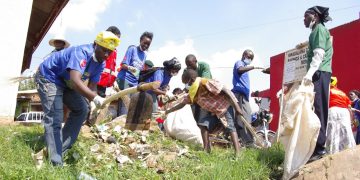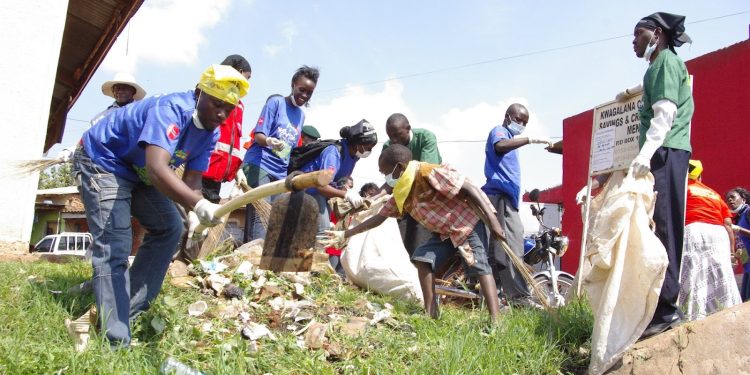The Ministry of Local Government has directed all Chief Administrative Officers, City Town Clerks, and Municipal Town Clerks to begin implementing the new “National Cleaning Days” program.
The initiative, mandated by a recent Cabinet Decision, is designed to improve public health and productivity across the country.
According to a letter dated September 15, 2025, from Permanent Secretary Ben Kumumanya, the National Cleaning Day will take place on the last Saturday of every month. The program will involve a “Whole of Government Approach,” bringing together Ministries, Departments, Agencies, Local Governments, and other key stakeholders like civil society organizations, religious and cultural institutions, and communities.
The cleaning efforts will be carried out at all levels, from the national and district levels down to the sub-county, parish, village, and individual household levels.
The initiative aims to accelerate the key outcomes of Pillar 4 of the Parish Development Model (PDM), which include: improving the quality of life, enhancing social inclusion, increasing the population’s life span and productivity, reversing catastrophic health expenditures, and catalyzing the money economy at the parish level.
Scope of Activities
The new directive outlines a wide scope of activities to address the social determinants of health.
The planned activities are categorised into five main areas: Environmental Cleanliness: This involves bush clearing, collecting refuse, clearing stagnant water, desilting drainage channels, and street sweeping. Waste Management: The program will promote the proper segregation, collection, transportation, and disposal of waste.
Others are: Safe Water: Efforts will include cleaning areas around water sources, protecting water sources, and cleaning water reservoirs. * Sanitation: This includes promoting rainwater harvesting, repairing sanitation facilities, and mobilising communities to construct new ones. and Hygiene: Awareness campaigns will be conducted for food handlers on food hygiene and safety. The initiative also seeks to improve or repair components of a standard homestead, such as handwashing facilities, kitchens, latrines, and refuse pits.
Official Directives
The letter from Permanent Secretary Ben Kumumanya explicitly instructs recipients to “urgently commence on the implementation of the above Directive with immediate effect”.
The directive was copied to several high-ranking officials, including the Minister and Minister of State for Local Government, the Minister and Permanent Secretary of Health, and the Head of Public Service/Secretary to the Cabinet.
NEMA Rallies Ugandans
The National Environment Management Authority (NEMA) has thrown its full support behind the newly launched National Cleaning Days (NCDs) initiative, citing health and economic gains.
In a staff meeting on Friday, Dr Barirega Akankwasah, the Executive Director of NEMA, emphasised that the NCDs are a crucial contribution to the nation’s development agenda, specifically aligning with Pillar 4 of the Parish Development Model (PDM).
“These national cleaning days will significantly contribute to improved quality of life, increased life expectancy, and a reduction in the health expenditures that frequently result from poor sanitation and environmental mismanagement,” Dr Akankwasah stated.
NEMA welcomes the initiative as a timely step directly supporting the Authority’s core mandate of ensuring a clean, healthy, and productive environment. The program is designed to deliver immediate and tangible environmental benefits, including the reduction of waste accumulation, unclogging of crucial drainage systems, and curbing prevalent flooding risks.
The initiative mandates sustainable practices like waste segregation, recycling, proper waste disposal, and a collective effort to cut down on plastic pollution. This is expected to yield positive impacts beyond sanitation, safeguarding vital water sources, wetlands, and soils, thus supporting biodiversity and agricultural resilience.
The NCDs also complement NEMA’s ongoing, highly impactful Yonja Uganda campaign, which has successfully raised public awareness about littering and waste management challenges in both urban and rural areas across the country. The Authority has committed to collaborating closely with Local Governments, Civil Society, Development Partners, and communities to ensure the sustained success of the program.
“NEMA calls upon all Ugandans to embrace NCDs as a collective responsibility, noting that the exercise is not only about cleaning the environment but also about safeguarding public health, building resilience, and fostering national productivity.”









